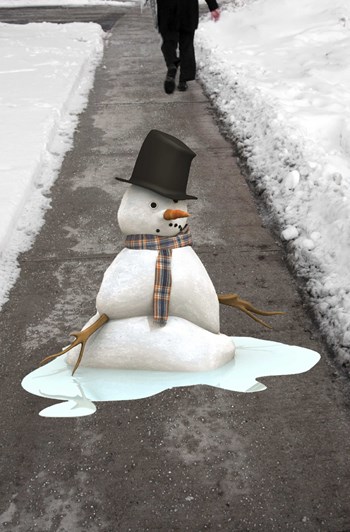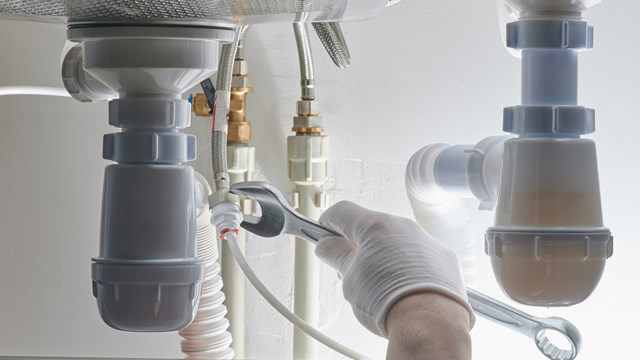
It's a fact of nature in this part of the country: with winter comes snow and ice. And more often than not, wintry weather makes for slippery, treacherous conditions on sidewalks and other paved surfaces. Obviously, a co-op or condo board or HOA’s primary interest in safeguarding against slips and falls is concern for the safety and well-being of their residents—but along with winter weather, lawsuits are also a fact of life, and if a snowy walkway or icy steps cause a serious injury, it can cost a lot of money in litigation and legal fees.
Step on a Crack...
Ted Wilson of Advanced Pavement Technologies in Fairfield has seen a lot of co-op and condo buildings deal with sidewalk issues. A sidewalk that's cracked or chipped can ultimately be a danger—and lots of cracks and chips worsen in the winter.
"I see it all the time," Wilson says. "Water builds up between the concrete and the Belgian block. When it gets cold, that water turns to ice, causing the pavement to expand and heave, and it becomes a liability."
And a history of slip-and-fall claims can cost a building or association beyond just legal costs. According to industry pros, communities with a history of slip-and-fall claims often pay more in premiums than those with better safety records. The reason for this is that repeated mishaps can suggest a lack of attention to or responsibility for the property on the part of association administrators. That can lead insurance carriers to consider raising the premium—or even dropping the community's coverage altogether, warns Alan Geisenheimer, CIC, president of the Geisenheimer Agency in Fair Lawn. "And lack of attention to snow and ice removal is probably king in this area," he says.
Icy Innovations
According to Wilson, there are many ways to prevent slip-and-fall accidents during the winter months. While continuous shoveling during snow and ice storms is probably the first thing that comes to peoples’ minds, de-icing products and hardware have come a long way in recent years. In fact, heavy snow shovels and hours of backbreaking work are fast becoming obsolete.
When it comes to snow- and ice-melting products, rock salt—the old standby—really isn't all it's cracked up to be. Wilson warns that by using salt instead of more modern de-icers, HOA maintenance crews are shortening the life span of the concrete, creating more opportunities for cracks and chips come spring. "Contractors should be using calcium chlorides instead of salt," Wilson says.
Calcium chloride, although cheaper than magnesium chloride, does not have the same protective elements in its chemical composition for pet and child safety. Magnesium chloride is also better for exterior concrete maintenance, although calcium is safe for usage in blacktop parking lots.
“Magnesium chloride is a bit safer for pets, especially dogs,” says John Fedele of Star Products in Cliffside Park. “Sometimes they have a hard time walking on calcium—it can hurt their paws.”
Jason Teigman of Hackensack-based GT DawnBrite recommends ice-melt products that come in a box rather than a bag (such as that with calcium chloride and magnesium chloride). “The others are just loose bags, and they harden once you leave the bag out,” Teigman says. “So you have to use all of it or risk wasting what's left. This product doesn’t harden, so you only have to use what you need.”
Overall, Fedele says that consistent usage of removal and cleaning products can keep building tenants safer and prohibit dangerous exterior icing. Re-application of products, although tedious, can ensure results on building lobbies and sidewalks—and addressing winter weather removal in a timely fashion can be the key to beating out winter residue removal. “There’s no preventing it," he says, "but the sooner you attack it, the better.”
After a storm has passed, Fedele says that exterior residue can be removed with a high pressure hose. He says rain and natural weathering also eventually remove the salt and snow residue from the sidewalks. For interior and lobby building maintenance, Fedele says Star Products makes a chemical rinse which removes ice residue off lobby floors without leaving damage.
Mop-on neutralizers are also a way of removing outside dirt and salt without damaging lobby flooring. “We sell a product for salt removal on marble or tile floors, which can often be scratched or even destroyed by salt tracked in by tenants,” Teigman says. “The neutralizer lifts the salt and does what a neutral clean won’t.”
Floor matting can also come in handy when trying to shield a lobby from salt and snow. “The first steps of dirt can be trapped in those mats, and we even include various types of designs and logos for the mats, while at the same time protecting their interior,” Teigman says.
Heat Beneath Your Feet
Another weapon in the arsenal against slip-and-fall liability isn't even visible. New paving products using a material called 'conductive concrete' can eliminate snow and ice buildup as a storm intensifies and continues. Using radiant heating coils or tubing embedded within the paving material itself, conductive concrete eliminates snow and ice as they hit the surface—so no more waiting until the storm stops to go out and shovel.
There are two common types of installations: hydronic, in which hot water or steam is circulated in pipes below pavement level, or electric, where coils or cables generate heat to melt the falling precipitation. Both systems involve a series of coils or tubing that are built into a development's driveways, walkways and steps, and controlled with a simple on/off manual switch. The systems can also be remote-controlled and programmed by temperature to automatically come on when snow and ice develop.
“A lot of what we’ve done is on the tail end of what European technology started,” says Jeff Wiedemann, a product manager with Uponor North America, a radiant heating (and cooling) technology firm based in Apple Valley, Minnesota. “Radiant heating is prevalent there, specifically in Sweden, and they build for snow melting,” he says. “Their applications are quite a bit smaller, so we expanded on it and [our] systems kept getting bigger. We saw the opportunity not only for space heating but for snow removal.”
Conductive concrete is becoming more of a must in luxury markets, where systems can be connected to modulating-condensing boilers or even waste-heat sources for added efficiency. “They help lower maintenance costs, and reduce the liability associated with slippery walkways,” Wiedemann says, adding that while radiant systems are more economical to install during initial construction rather than as a retrofit to existing pavement, they can be implemented in just about any setting where snow and ice are concerns. “And once it’s in,” he says, “it has a long life—well over a hundred years.” He calls the sturdy tubing inside hydronic systems “polyethelene with an attitude.”
A key benefit of these systems is their rapid response in areas where handicap access or emergency traffic are a consideration, says Tom Szarawarski, office manager of Faber Industrial Technologies in Clifton, which distributes snow melting and floor warming systems. Built-in radiant heat is especially useful on areas that are hard to plow, such as steeply graded roadways and pavers or other easy-to-damage surfaces. According to the pros, the systems have also been particularly popular in active adult and retirement communities.
"Obviously as people get older, they are more likely to slip and get injured on ice and snow," he says. "We have a lot of snowmelt installations on stairs, so people don't have to physically go and shovel steps. They're automated, so when it does get cold enough and there is precipitation, it works. These systems provide a way to keep surfaces safer—and in the long run it's going to be more cost-efficient."
The Cost to Defrost
According to the pros, operating costs for snow melting systems vary widely depending on the size of the development, the area being treated, local utility costs, the type of unit being installed and the speed of operation.
For example, a hydronic system may initially be more expensive to install and maintain than a heat-coil system, but tends to be less costly to operate. Because a mix of water, antifreeze and glycol fluid needs to be heated up inside the tubing embedded in the concrete, it may take an hour or more for the paved surface to heat up. On the other hand, because the circulating liquid holds its heat longer, hydronic systems don't have to run at full power all the time—and that saves money.
By contrast, electric systems heat up faster than hydronics and require less capital for installation, but operating costs can make them prohibitively expensive for use in larger areas. Some pros also feel that electric heat may be harder on the surrounding concrete over time, and lead to cracking and chipping.
"Installation of a full hydronic system could cost anywhere from $5 to $8 a square foot," according to one contractor, "and that includes the tubing, hardware, the heat source and the labor."
Annual operating costs are also estimated to range from about 12 cents to 25 cents per square foot. So on average, it will cost from $120 to about $250 to melt the snow off a 1,000-square-foot driveway. Depending on local utility rates, electric systems typically cost more to operate. The seasonal cost for that same 1,000-square-foot driveway at about 50 kilowatts ranges from about $275 a year with light snowfall to upwards of $700 annually with moderate to heavy snowfall.
It's also possible to customize how the heating elements are arranged in order to save on installation costs—an HOA could opt to heat a narrower walkway down the middle of a sidewalk or driveway, rather than paying to warm the entire surface.
Snow and ice melt products like residential mats with special heating coils are also produced by a Paterson, New Jersey company called HeatTrak. HeatTrak’s residential mats for steps and walkways, which can be interconnected via insulated cords, retail for about $50 for steps, $99 for a doormat, and $120 for walkways, respectively. Industrial mats cost upwards of a few hundred dollars to more than $1,000, depending on the size. Last year, HeatTrak introduced a wireless remote and thermostat controller. The industrial mats plug into a standard 120V or 240V outlet generating enough heat to melt snow at the rate of two inches an hour. Mats are sturdy enough to be left outside an entire winter season.
Whether you go with sprinkling ice-melt products or invest in conductive concrete, being proactive about ice and snow is the key to saving your residents from injury and saving your association money on slip-and-fall litigation. “Some buildings spend thousands on winter weather removal,” says Teigman. “But the risk of their tenants getting hurt is a large one, and doing anything they can saves them money in the long run for prevention against lawsuits in the future.”
Hannah Fons is associate editor of The New Jersey Cooperator.






Leave a Comment